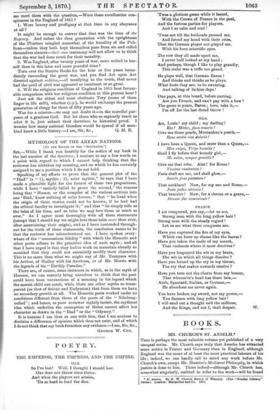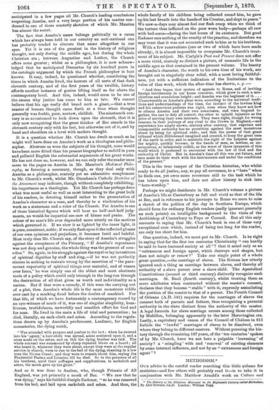BOOKS •
MR. CHURCH'S ST. ANSELM.*
Tars is perhaps the most valuable volume yet published of a very unequal series. Mr. Church says truly that Anselm has attracted more notice in France and Germany than in England, although England was the scene of at least the most practical labours of his life ; indeed, we can hardly call to mind any work before Mr. Church's own, except Mr. Maurice's Medimval Philosophy, in which justice is done to him. There indeed—although Mr. Church has, somewhat singularly, omitted to refer to the work—will be found • M. Anseles. By R. W. Church, Rector of Whatley. (The "Sunday Library" Sense.) London: Macmillan and Co. 1870.
anticipated in a few pages all Mr. Church's leading conclusions respecting Anselm, and a very large portion of his matter con- densed in one of those masterly sketches of which Mr. Maurice has almost the secret.
The fact that Anselm's name belongs politically to a cause which has always been held in our country an anti-national one has probably tended to obscure that name altogether in our eyes. Yet it is one of the greatest in the history of religious thought, not only during the middle ages, but during the whole Christian era ; between Augustine and Luther, the Church offers none greater ; whilst as a philosopher, it is now acknow- ledged that he anticipated Descartes by six hundred years in the ontologic argument by which the French philosopher is best known. It may, indeed, be questioned whether, considering the times in which Anselm lived, the horrors of all sorts of that dark eleventh century, and of the first years of the twelfth, history affords another instance of genius lifting itself so far above the contemporary level. And this, indeed, would seem to be one of the causes why justice has come to him so late. We cannot believe that his age really did breed such a giant,—that a true master of human thought came forth at a time when thought generally was feeble, poor, narrow, childish. The nineteenth cen- tury is so accustomed to look down upon the eleventh, that it is only now recognizing that the great thinker of Bec stands in the eleventh century only with his feet, but otherwise out of it, and by head and shoulders on a level with modern thought.
It is a question whether Mr. Church has dwelt as much as he might well have done on Anselm's work as a theologian and philo- sopher. Abstruse as were the subjects of his thought, none would have been more fitted than his present biographer to unfold in pure and pellucid English the substantial arguments of his great works.
He has not done so, however, and we can only refer the reader once more to the pages on Anselm in Mr. Maurice's Mediaeval Philo- sophy, as forming a necessary, though, as they deal only with Anselm as a philosopher, scarcely yet an exhaustive complement to Mr. Church's work, whilst Mr. Oxenham's Catholic Doctrine of the Atonement may indicate, though without completely exhibiting, his importance as a theologian. Yet Mr. Church has perhaps done what was most useful as well as most interesting to the great bulk of his readers, in devoting himself rather to the presentation of Anselm's character as a man, and thereby to a vindication of his work as a statesman and a ruler of the Church. For Anselm is one of those historical figures which will bear no half-and-half judg- ments, no would-be impartial see-saw of blame and praise. The colour of no man's life ever depended more utterly on the motives which governed it. If we view it as lighted by the inner light, it is pure, consistent, noble; if we only flash upon it the reflected gleams of our own opinions and prejudices, it becomes lurid and baleful. Most truly does Mr. Church say, of the story of Anselm's struggles against the acceptance of the Primacy, " If Anselm's repentance was not deep and genuine, the whole thing was the grossest of com- edies." So, again, in his struggle against the royal or lay investiture of spiritual dignities by staff and ring, —if he was not perfectly sincere in seeking to restrain wrong by the assertion of " the para- mount superiority of spiritual things over material, and of reason over force," he was simply one of the ablest and most obstinate tools of a policy which could only triumph in the long run through the destruction of all that gives us worth and individuality as a nation. But if that were a comedy, if this were the carrying out of a plot, then Anselm's whole life is the most monstrous riddle ever cast by a mocking fiend before the doubts of mankind. For that life, of which we have fortunately a contemporary record by an eye-witness of much of it, was one of singular simplicity, hum- bleness, truthfulness, unworldly and unselfish effort for God and for man. He lived in the main a life of trial and persecution ; he died, literally, on sack-cloth and ashes. According to the regula- tions drawn up by Anselm's predecessor, Lanfranc, for English monasteries, the dying monk,
Was attended with prayers and psalms to the last ; when he entered into his agony,' a hair-cloth was spread, ashes scattered upon it, and a cross made on the ashes, and on this the dying brother was laid. The whole convent was summoned by sharp repeated blows on a board ; all who heard it, whatever they were about, except they were at the regular service in church, were to run to the bed of the dying, chanting in a low tone the Nicene Creed ; and they were to remain about him, saying the Penitential Psalms and Litanies, till he died. So in the presence of all his brethren, amid their suffrages and supplication; in sackcloth and ashes, the monk gave up the ghost."
And so it was done to Anslem, who, though Primate of All England, was yet primarily a monk of Bee. " We saw that he was dying," says his faithful disciple Eadoner, " so he was removed from his bed, and laid upon sackcloth and ashes. And thus, the
whole family of his children being collected round him, he gave up his last breath into the hands of his Creator, and slept in peace." We now-a-days may almost feel our flesh creep when we think of the torture thus inflicted on the poor worn body—perhaps all raw with bed-sores—during the last hours of its existence. But good Eadoner sees nothing of the cruelty of the practice, and therefore we may trust that it was not accounted such to him or to his brethren.
With a few reservations (one or two of which have been made already), it is almost impossible to overpraise Mr. Church's treat- ment of his subject. Mr. Carlyle's Past and Present does not offer a more vivid, scarcely so distinct a picture, of monastic life in the middle ages as that contained in the present volume. The beauty of Anselm's character, the worth to his own time of his work, are brought out in singularly clear relief, with a most loving faithful- ness, yet with a sufficient indication of the limitations to the value of that work, which the after-time has shown, e. g. :—
" And thus began that system of appeals to Rome, and of inviting foreign interference in our home concerns, which grew to such a mis- chievous and scandalous height ; and Anselm was the beginner of it.... Unanswerable as Anselm's pleas were, according to the universal tradi- tions and understandings of the time, the instinct of the lawless king and his subservient prelates was right, even when they knew not how to silence Anselm and their own conscience, and were leagued to- gether, the one to defy all control, the other to uphold injustice as the price of serving their own interests. They were right, though for wrong reasons, in their jealousy of any rival to the Crown in England,—and experience has amply shown, century after century, that supreme and irresponsible authority has no protection against the most monstrous abuse by being for spiritual ends ; and that the power of that great tribunal which Hildebrand imagined and created, to keep the great ones of the earth in order, and to maintain the right of the helpless against the mighty, quickly became, in the hands of men, as lawless, as un- scrupulous, as infamously selfish, as the worst of those tyrannies of this world which it professed to encounter with the law of God and the authority of Christ. But in Anselm's time all this was yet future, and men must do their work with the instruments and under the conditions of the present."
This is the true temper of the Christian historian, who whilst ready to do all justice, nay, to pay all reverence, to a " hero " when he finds one, yet owes more reverence still to the task which he has taken upon him, and dare not allow history to sink into " hero-worship."
Perhaps we might desiderate in Mr. Church's volume a picture of Anselm's life at Canterbury as full and vivid as that of the life at Bec, and in reference to his journeys to. Rome we seem to miss a sketch of the politics of the day in Southern Europe, which should form for ordinary English readers (sadly ignorant generally on such points) an intelligible background to the visits of the Archbishop of Canterbury to Pope or Council. But all this only amounts to saying that Mr. Church's book is one of those very exceptional ones which, instead of being too long for the reader, are only too short for him.
One question, indeed, we must put to Mr. Church. Is he right in saying that for the first ten centuries Christianity " can hardly be said to have leavened society at all "? that it acted only as an " extraneous and foreign agent, which destroys and shapes, but does not mingle or renew ?" Take one single point of a whole great question,—the marriage of slaves. The Roman law utterly ignored such a thing as marriage between slaves, and thereby all authority of a slave parent over a slave child. The Apostolical Constitutions (second or third century) distinctly recognize such marriages. St. Basil (fourth century), whilst treating them as mere adulteries when contracted without the master's consent, declares that they become " stable " with it, expressly assimilating the position of the master to that of a parent. The Fourth Council of Orleans (A.D. 541) requires for the marriages of slaves the consent both of parents and fathers, thus recognizing a parental authority in the slave distinct from the authority of the master. A legal formula for slave marriage occurs among those collected by Mabillon, belonging apparently to the later Merovingian era. Lastly, a capitulary and canon of the Council of Chalons in 813 forbids the "lawful" marriages of slaves to be dissolved, even where they belong to different masters. Without pursuing the his- tory through the remaining 187 years, of the ten centuries' spoken of by Mr. Church, have we not here a palpable ' leavening' of society? a ' mingling' with and 'renewal' of existing elements by some internal influence, and not by an " extraneous and foreign agent " ?































 Previous page
Previous page